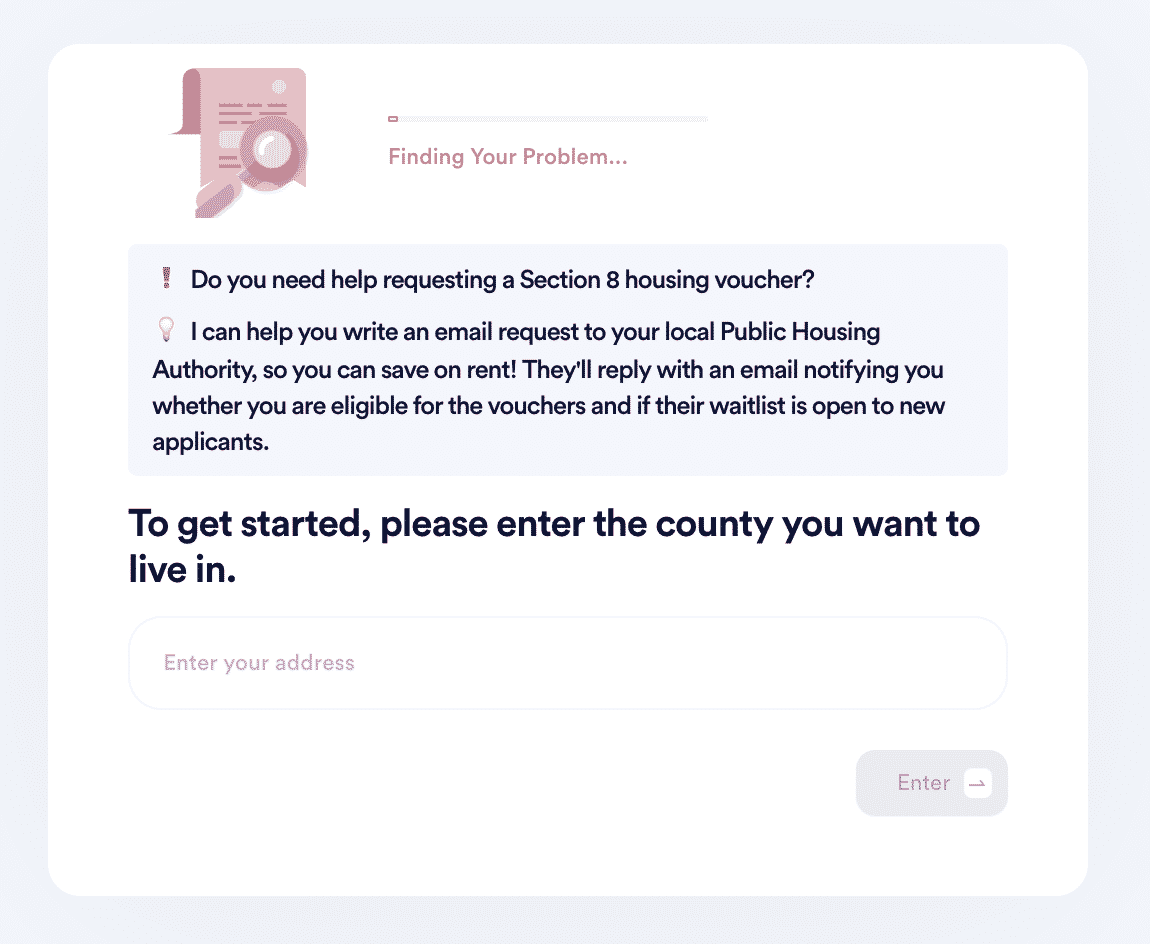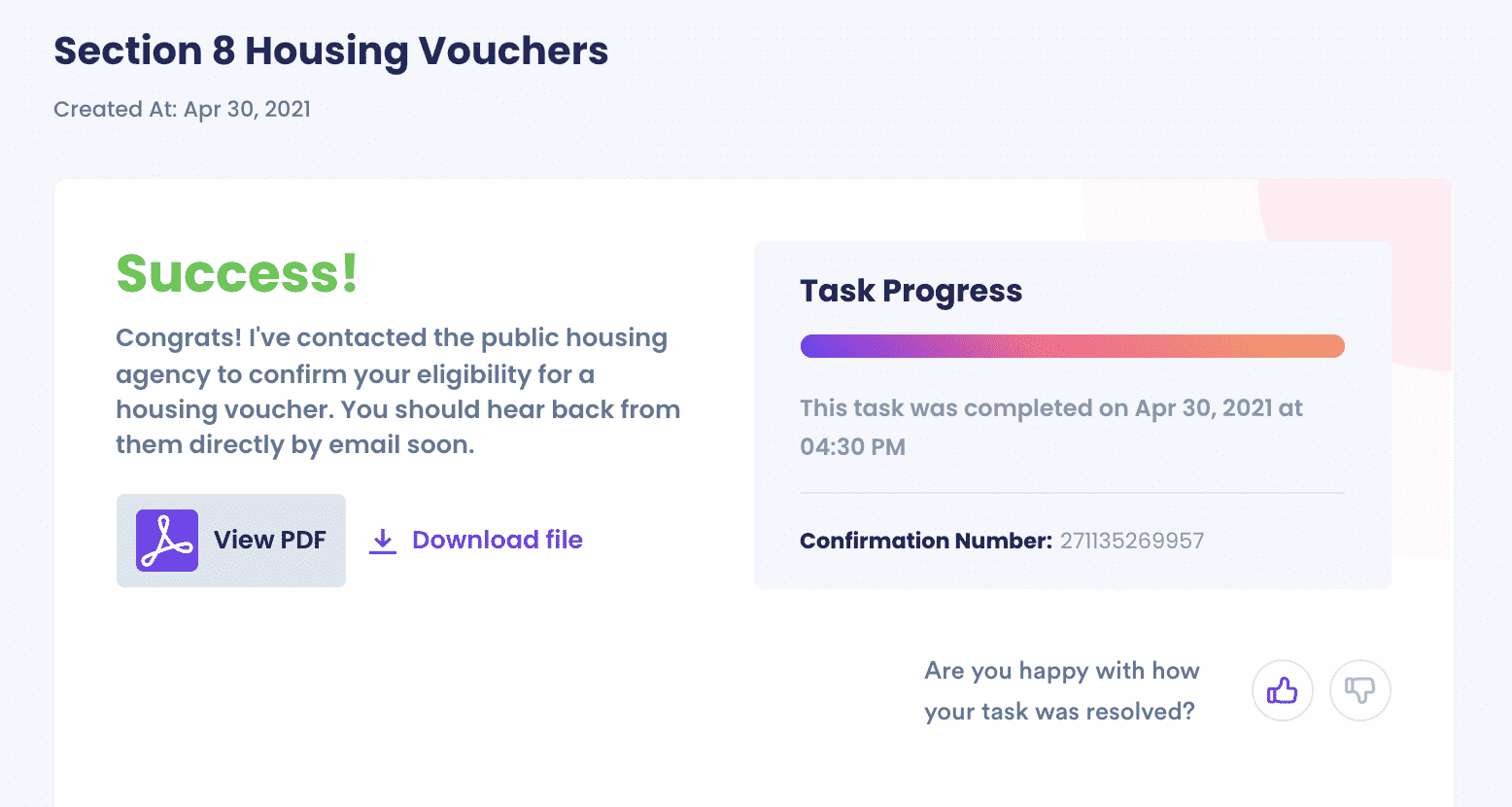Can You Get Low-Income Housing With an Eviction?
Are you in need of low-income housing? If so, there are many factors that can make someone ineligible, and it can be frustrating to figure out. You may have questions like, and "How can you get Section 8 immediately?"
Applying for Section 8 can be difficult, and the entire process can be tedious and hard. Luckily, DoNotPay can help you apply for Section 8 government housing so you don't have to navigate the process alone.
Let's discuss how to apply for Section 8, and how DoNotPay can make the process go seamlessly.
What Is Low-Income Housing?
The U.S. Department of Housing and Urban Development (HUD) provides low-income housing to people who meet certain criteria in the United States. In fact, there are currently over 970,000 households living in public housing units throughout the country today.
HUD works with Housing agencies across the country by providing vouchers to pay the difference for rent for individuals who can't pay the full amount.
Can You Get Low-Income Housing With an Eviction?
Yes, it is possible to before. Especially if you were evicted due to failure to pay your rent.
One of the questions listed on your HUD housing application will ask whether you've ever been evicted. Be honest, and explain if this has happened before.
If you've been evicted for criminal or drug activity in the past, Federal Law states that you aren't eligible for public housing for three years. This includes all public housing across the United States, and Housing Authorities (HAs) don't have a choice.
If you have a past conviction for criminal or drug activity on your record, and it's more than three years old, you can be eligible for Section 8 vouchers again. HAs have the right to consider your prior evictions as part of an "adverse rental history," and they can deny your application form.
It's also important to note that even if one person in your household has a past conviction for criminal or drug activity, it can ruin your entire household's eligibility for public housing.
Who Is Eligible for Low Income Housing?
There are specific requirements that must be met in order for a household to become eligible for public housing.
To become eligible, an applicant must:
- Be a U.S. citizen or meet the requirements as a non-citizen
- Be at least 18 years old
- Meet the median gross income requirement
If there are members in your household who are not U.S. citizens, you can still be eligible for public housing, although it may affect the type of voucher that you receive.
To meet the minimum gross income requirements, HUD recognizes three different levels. Each level is based on the median income level for the county in question, so you could be eligible for affordable housing in one place but may not meet the requirements in another. Let's look at the different levels.
| Low-Income Limit | To fall into the low-income limit tier, your household must make less than 80% of the median income in your local county. |
| Very Low-Income Limit | This tier requires that your household makes less than 50% of the median income in your county. |
| Extremely Low-Income Limit | To qualify for vouchers in this tier, your household must make less than 30% of the median income in your county. |
There are also many restrictions that can keep you from qualifying for public housing, even if your gross income is below the limit. One of these restrictions includes having prior criminal convictions.
How to Apply for Low-Income Housing
To apply for the Section 8 rental assistance program, you will have to fill out a lot of paperwork. This can be really stressful, especially when money is tight. DoNotPay can help you fill out these forms correctly.
Some of the information you'll need to include consists of:
- The name, sex, date of birth, birth certificate and relationship to the family head for every person in your household.
- Your current phone number.
- Your current address.
- Your estimated gross household income for the next year.
- Contact information for your employer and bank to verify your income.
During this process, you'll need to consent to a background check. You'll also need to provide a list of prior landlords who can vouch that you'll be a good tenant. If you've had prior convictions, this information will pop up, and it can make it hard to get low-income housing.
Apply for Low-Income Housing With Help From DoNotPay
By following two simple steps, DoNotPay can help you apply for low-income housing even if you’ve been , and we'll get you the answers you need.
Here's what you need to do:
- Answer a few questions about your income, family size, which county you hope to live in, veteran/disability status, etc.

- DoNotPay will find the PHA in charge of that county and contact them with all of your eligibility information to determine if you can start the application process. They'll contact you directly via email with the next steps.

That's all you need to do! After you've given us the information we need, we'll submit it to the proper authorities. Just sit back and wait to hear from the Housing Authority for your next steps.
What Else Can DoNotPay Do for You?
DoNotPay can solve various problems so you don't have to waste your time.
Here are some of the things we can do for you:
- Send Demand Letters To a person or business in small claims court
- Schedule DMV appointments
- Reduce your property taxes
- Help pay your bills
- Sign up for free trials
- Find missing money
- File a complaint for you
- Find scholarships for you and apply for them
Don't waste time doing tedious tasks that DoNotPay can handle. Lighten your load with help from DoNotPay.
 By
By